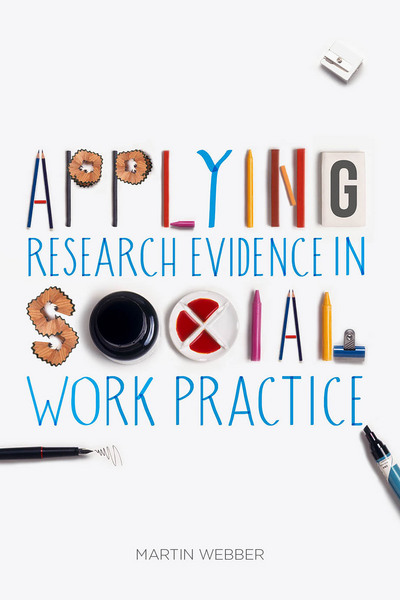Applying Research Evidence in Social Work Practice is published by Palgrave Macmillan this week. This edited book brings together some excellent authors who offer insightful guidance on how to use research in social work practice. It
Applying Research Evidence in Social Work Practice is published by Palgrave Macmillan this week.
This edited book brings together some excellent authors who offer insightful guidance on how to use research in social work practice. It provides useful hints for both social work students and practitioners working across the full range of social work specialisms. It uses case scenarios to explore how research can inform decision-making in practice and to help us to better understand the social problems people are faced with. The book also features practice reflections which help readers to consider how they can apply its learning to their practice.
Part 1
The first part of the book explores the process of finding, appraising and using research in practice:
Chapter 1 opens with an introduction to some of the reasons why research is so important for social work practice. Co-authored with Sarah Carr (aka The Social Care Elf), we explore key research methods and urge readers to see beyond the debate of evidence-based vs. evidence-informed practice.
Chapter 2 provides practical guidance on how to locate the best social work research that is relevant for your needs. Written by Chartered Senior Information Specialist Paul Ross from the Social Care Institute of Excellence, it takes readers through a worked example of finding research to answer a practice-based query.
Chapter 3 is written by experienced research analysts and researchers Sarah Carr and Lisa Bostock, formerly of the Social Care Institute of Excellence. It provides tips and examples of how to appraise the quality of research to help you decide whether it’s worth bothering with!
Chapter 4 focuses on how research evidence can be used to inform social work assessments. Written by my colleague Mark Hardy from the University of York, this explores pragmatism as a framework for social work assessments and the role of research in this.
Chapter 5 is written by Tony Evans, Professor of Social Work at Royal Holloway, University of London, who co-authored Evidence and Knowledge for Practice with Mark a few years ago. Tony explores how research evidence is used in decision-making and discusses the daily application of research in social work practice.
Finally, chapter 6 is written by Victoria Hart, a registered social worker with a background in mental health social work. She provides a practitioner’s perspective on the challenges and opportunities of applying research in practice.
Part 2
The second part of the book focuses on applying research evidence in different social work contexts. Each chapter includes a summary of research relevant to the specific practice field, a case scenario which a social worker may typically encounter and a discussion of how research could inform a social worker’s assessment, decision-making and intervention in the context of the case scenario.
Chapter 7 is co-authored by Karen Broadhurst, Senior Lecturer at the University of Manchester and Andrew Pithouse, Professor of Social Research at Cardiff University. Karen and Andrew explore the research evidence which is used to inform safeguarding children.
Chapter 8 is written by Robin Sen, Lecturer in Social Work at the University of Sheffield and focuses on the research evidence used to inform working with looked-after children.
Chapter 9 is written by the prolific author and specialist on child and adolescent mental health services, Steven Walker. He explores the research evidence which informs working with young people with additional needs.
Chapter 10 is co-authored by substance misuse specialists Wulf Livingston from Glyndwr University and Sarah Galvani of the Tilda Goldberg Centre for Social Work and Social Care at the University of Bedfordshire. They focus on the research evidence which informs work with people who experience alcohol or other drug problems.
Chapter 11 is co-authored by Nick Gould, Emeritus Professor of Social Work at the University of Bath, and Tom Lochhead, the Mental Health Professional Lead for social work in Bath and North-East Somerset. They explore the research evidence which informs working with people with mental health problems.
Chapter 12 is written by Hannah Morgan, a Lecturer in Disability Studies at Lancaster University. She focuses on research which informs working with people with a disability.
Chapter 13 focuses on research evidence used to inform working with offenders and is written by David Smith, Emeritus Professor of Criminology at Lancaster University.
Chapter 14 is written by Jill Manthorpe, Professor of Social Work at the Social Care Workforce Research Unit, King’s College London. She explores the research which informs working with older people.
Lastly, in chapter 15 I pull together some of the key themes of the book and explore synergies between social work research and practice. I conclude that there is something we can all do to help social work agencies become learning organisations and social work practice to be as effective as possible in improving outcomes for service users:
To facilitate the translation of social work research findings into practice, practitioners need to be supported to develop their research literacy. This includes being given the opportunity to interrogate research findings and/or conduct their own research to answer practice-based questions. Social work researchers need to retain their connections with practice and respond to research questions arising from it. Social work academics need to foster the development of practice-research partnerships. And employers need to support the professional development of their social workers and be open to new ways of working as informed by the latest research findings.
There is something for us all to be doing, so let’s get on and do it. (p. 229)
It has been a pleasure to work with some great people in pulling this book together. Their contributions are superb and are compelling to read. Thank you.
Applying Research Evidence in Social Work Practice is available from Palgrave Macmillan as a paperback and an Ebook.


One thought on “Applying Research Evidence in Social Work Practice”